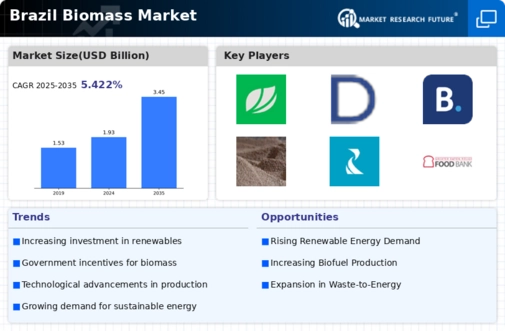The biomass market in Brazil is characterized by a dynamic competitive landscape, driven by increasing demand for renewable energy sources and government policies favoring sustainability. Key players such as Raizen (BR), Cargill (BR), and Sao Martinho (BR) are at the forefront, each adopting distinct strategies to enhance their market positioning. Raizen (BR) focuses on innovation in biofuel production, leveraging advanced technologies to optimize efficiency. Cargill (BR) emphasizes strategic partnerships to expand its supply chain capabilities, while Sao Martinho (BR) is investing in digital transformation to streamline operations and improve sustainability metrics. Collectively, these strategies contribute to a competitive environment that is increasingly focused on technological advancement and operational efficiency.
In terms of business tactics, companies are localizing manufacturing and optimizing supply chains to enhance responsiveness to market demands. The market structure appears moderately fragmented, with several players vying for market share, yet the influence of major companies is substantial. This competitive structure fosters an environment where innovation and strategic collaborations are essential for maintaining a competitive edge.
In November 2025, Raizen (BR) announced a partnership with a leading technology firm to develop next-generation biofuels, which is expected to significantly enhance their production capabilities. This strategic move underscores Raizen's commitment to innovation and positions the company to capitalize on the growing demand for cleaner energy solutions. The collaboration may also facilitate access to advanced technologies that could streamline production processes and reduce costs.
In October 2025, Cargill (BR) expanded its biomass sourcing network by acquiring a local biomass supplier, thereby enhancing its supply chain resilience. This acquisition is strategically important as it not only increases Cargill's biomass procurement capacity but also strengthens its market presence in Brazil. The move reflects a broader trend of consolidation within the industry, as companies seek to secure reliable sources of raw materials amid fluctuating market conditions.
In September 2025, Sao Martinho (BR) launched a new digital platform aimed at optimizing its biomass production processes. This initiative is indicative of the company's focus on digital transformation, which is likely to improve operational efficiency and reduce waste. By integrating digital technologies into its operations, Sao Martinho positions itself to respond more effectively to market changes and consumer preferences, thereby enhancing its competitive stance.
As of December 2025, current trends in the biomass market include a pronounced shift towards digitalization, sustainability, and the integration of AI technologies. Strategic alliances are increasingly shaping the competitive landscape, enabling companies to leverage shared resources and expertise. Looking ahead, competitive differentiation is expected to evolve, with a greater emphasis on innovation and technology rather than solely on price. Companies that can effectively harness these trends will likely emerge as leaders in the biomass market, driving forward the transition to a more sustainable energy future.





















Leave a Comment